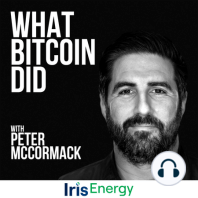63 min listen

The Decentralisation of Bitcoin Mining with Braiins
The Decentralisation of Bitcoin Mining with Braiins
ratings:
Length:
92 minutes
Released:
Apr 5, 2023
Format:
Podcast episode
Description
“What is the end goal for V2? Is allowing miners to build the block themselves, but at the same time use the money aspect of pool mining…the money would be still the same, but the transaction selection would be distributed, therefore, more secure for the whole network.”— Pavel MoravecJan Čapek and Pavel Moravec are the co-founders of Braiins, a Bitcoin Mining company. In this interview, we discuss Braiins update to their updated Stratum V2 protocol software for pooled mining, how it helps solve Bitcoin mining’s centralisation problem, and why Braiins has given the Stratum software away to the community as open source.- - - - The development and growth in pooled Bitcoin mining has been a critical part of maintaining Bitcoin’s security. The synergies of scale were always going to affect Bitcoin as it transitioned into a more mature technology. However, centralisation is an existential threat to Bitcoin. Mining pools, started in 2010 by Jan and Pavel, therefore enabled small-scale miners to continue to gain value from limited hash power, which thereby strengthened the network's security. Nevertheless, just as the rise of the mega miners concentrated the hashrate, so did the rise of major mining pools. In February over 52% of the hashrate was controlled by just 2 mining pools (Foundry USA and Antpool). This is not to state that these mining pools have malevolent intentions. But Bitcoin must always guard against an attack through trustless mechanisms. Marathon’s flip-flopping over filtering non-OFAC-compliant transactions in 2021 was a warning.The solution to the problem lies in the communication protocol used to connect miners with mining pools. The existing protocol, Stratum V1, was developed and distributed as open-source software by Braiins in 2012. Whilst it has successfully supported Bitcoin mining pools since then, it was in need of an upgrade for a series of reasons. Such an upgrade enabled this centralisation issue to be tackled head-on. Stratum V2 transfers the power for writing new blocks from the pool operators and into the hands of individual miners. This is enabled by a sub-protocol within Stratum V2 called the “Job Negiotator”. The incentive for adoption is that the other updates enable faster (i.e. more profitable) and more secure communications. It is an elegant solution built with the same technical and community-facing ethos as Bitcoin’s open-source code. Děkuji Braiins!- - - - This episode’s sponsors:Iris Energy - Bitcoin Mining. Done Sustainably Gemini - Buy Bitcoin instantlyLedn - Financial services for Bitcoin hodlersBitcasino - The Future of Gaming is hereLedger - State of the art Bitcoin hardware walletWasabi Wallet - Privacy by default-----WBD641 - Show Notes-----If you enjoy The What Bitcoin Did Podcast you can help support the show by doing the following:Become a Patron and get access to shows early or help contributeMake a tip:Bitcoin: 3FiC6w7eb3dkcaNHMAnj39ANTAkv8Ufi2SQR Codes: BitcoinIf you do send a tip then please email me so that I can say thank youSubscribe on iTunes | Spotify | Stitcher | SoundCloud | YouTube | Deezer | TuneIn | RSS FeedLeave a review on iTunesShare the show and episodes with your friends and familySubscribe to the newsletter on my websiteFollow me on Twitter Personal | Twitter Podcast | Instagram | Medium | YouTubeIf you are interested in sponsoring the show, you can read more about that here or please feel free to drop me an email to discuss options.
Released:
Apr 5, 2023
Format:
Podcast episode
Titles in the series (100)
The Crisis Across All Markets with Peter Doyle by What Bitcoin Did with Peter McCormack